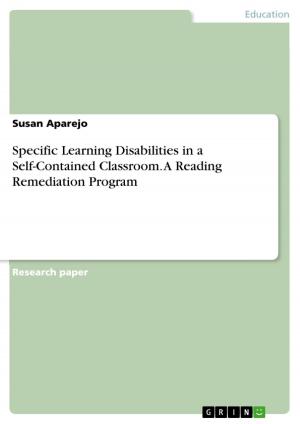Family portrayals in 'A Ballad Of Remembrance' - How Robert Hayden dealt with his 'Greatest Discouragement'
How Robert Hayden dealt with his 'Greatest Discouragement'
Nonfiction, Entertainment, Drama, Anthologies| Author: | Wiebke Formann | ISBN: | 9783638837989 |
| Publisher: | GRIN Verlag | Publication: | October 25, 2007 |
| Imprint: | GRIN Verlag | Language: | English |
| Author: | Wiebke Formann |
| ISBN: | 9783638837989 |
| Publisher: | GRIN Verlag |
| Publication: | October 25, 2007 |
| Imprint: | GRIN Verlag |
| Language: | English |
Seminar paper from the year 2006 in the subject American Studies - Literature, grade: 1,0, Ernst Moritz Arndt University of Greifswald, course: American Poetry, 16 entries in the bibliography, language: English, abstract: Poets are artists and therefore very creative people. But their artistic faculty does not - in most cases - conjure out of nothing. Poets are influenced by many different things. Almost all lyricists name some other members of their art who directly or indirectly made an impact on their very own work - who they used as a kind of an idol or who even aroused their interest in poetry. Robert Hayden is no exception. He admits to be influenced by poets such as Keats , Byron, Carl Sandburg, Countee Cullen and more. Naturally poets are also influenced by their surroundings, namely nature, landscape, history and of course by people, especially by friends and family members. For Hayden, and probably almost all other poets, poems serve as a means of coming to terms with particular situations. Robert Hayden's upraising was not exactly typical; his parents separated soon after his birth and he was brought up by poor foster-parents. He states that the 'greatest discouragement' were the circumstances he lived in: His family neither had money nor education; at the age of forty he had to find out that his foster-parents had never formally adopted him and the worst thing were the 'conflicts, the quarrelling, the tensions that kept us most of the time on the edge of some shrill domestic calamity.' (Both McCluskey 138) This term paper aims at illustrating how Robert Hayden - in his poems - coped with his family background and his position between the people who loved him and who struggled about being loved most in turn. To fully understand the emotions of Robert Hayden and his attitude towards his foster-parents and his mother I will - in the first chapter - provide a depiction of his youth and his relationship between him and his natural parents and foster parents. I chose to concentrate on three poems; two from the collection A Ballad of Remembrance because they emerged at a point in Hayden's life where he felt he needed to recall to his past and besides these poems illustrate a portrayal of his foster parents. In the second chapter I will present a description of his foster mother and father on the basis of information taken from these two poems. The third chapter will, on the basis of the third poem 'Names', illustrate Robert Hayden's identical crisis which emerged from his discovery that he had not been adopted legally. Finally I will evaluate the information gained from chapters one to three and present a summary of how Robert Hayden coped with his greatest discouragement.
Seminar paper from the year 2006 in the subject American Studies - Literature, grade: 1,0, Ernst Moritz Arndt University of Greifswald, course: American Poetry, 16 entries in the bibliography, language: English, abstract: Poets are artists and therefore very creative people. But their artistic faculty does not - in most cases - conjure out of nothing. Poets are influenced by many different things. Almost all lyricists name some other members of their art who directly or indirectly made an impact on their very own work - who they used as a kind of an idol or who even aroused their interest in poetry. Robert Hayden is no exception. He admits to be influenced by poets such as Keats , Byron, Carl Sandburg, Countee Cullen and more. Naturally poets are also influenced by their surroundings, namely nature, landscape, history and of course by people, especially by friends and family members. For Hayden, and probably almost all other poets, poems serve as a means of coming to terms with particular situations. Robert Hayden's upraising was not exactly typical; his parents separated soon after his birth and he was brought up by poor foster-parents. He states that the 'greatest discouragement' were the circumstances he lived in: His family neither had money nor education; at the age of forty he had to find out that his foster-parents had never formally adopted him and the worst thing were the 'conflicts, the quarrelling, the tensions that kept us most of the time on the edge of some shrill domestic calamity.' (Both McCluskey 138) This term paper aims at illustrating how Robert Hayden - in his poems - coped with his family background and his position between the people who loved him and who struggled about being loved most in turn. To fully understand the emotions of Robert Hayden and his attitude towards his foster-parents and his mother I will - in the first chapter - provide a depiction of his youth and his relationship between him and his natural parents and foster parents. I chose to concentrate on three poems; two from the collection A Ballad of Remembrance because they emerged at a point in Hayden's life where he felt he needed to recall to his past and besides these poems illustrate a portrayal of his foster parents. In the second chapter I will present a description of his foster mother and father on the basis of information taken from these two poems. The third chapter will, on the basis of the third poem 'Names', illustrate Robert Hayden's identical crisis which emerged from his discovery that he had not been adopted legally. Finally I will evaluate the information gained from chapters one to three and present a summary of how Robert Hayden coped with his greatest discouragement.















